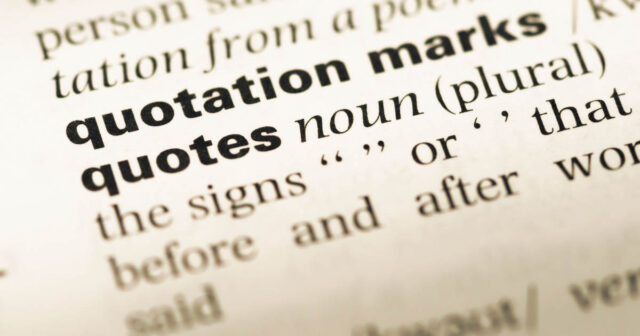Punctuation
Become a pro at punctuation! Enhance the clarity and flow of your writing by mastering the use of commas, semicolons, hyphens, parenthesis, ellipsis, quotation marks...and various other types of punctuation.
-

Proofreading Tips: How to Proofread Quotations
Proofreading Tips: How to Proofread Quotations
Published Oct 23, 2021
Last Updated Jun 20, 2024Academic writing accounts for a significant portion of many freelance proofreaders’ work. And, along with some other non-fiction, academic writing often relies heavily on quotations. It is thus important to know how to proofread quotations. In this post, we give an overview of things to consider when proofreading quotations in academic or other non-fiction writing. […]
-

Proofreading Tips: What to Do With Comma Splices
Proofreading Tips: What to Do With Comma Splices
Published Sep 23, 2021
Last Updated Nov 12, 2024A good proofreader will know how to spot and correct common punctuation errors. One of the most common of these is the comma splice. But what exactly are comma splices, and how can you fix them? Read on to find out more. What Are Comma Splices? A comma splice is what happens when two independent […]
-

5 Easy-To-Miss Apostrophe Errors
Published Jun 10, 2021
Last Updated Oct 07, 2024A good proofreader will always check for apostrophe errors. And, as a proofreader, you should know the basics of how this punctuation mark works already. However, some apostrophe errors are easier to miss! In this post, we will explore five easy-to-miss errors to look out for: Exceptions to the rules about possessives and words that […]
-

Hyphens and Dashes in AMA Style
Published Jun 06, 2021
Last Updated May 16, 2023The AMA Manual of Style (11th edition) is an academic style guide widely used in the medical sciences. As an academic proofreader, then, you may need to learn the basics of this style. And, having previously introduced the AMA referencing system, this post will focus on how to use hyphens and dashes in AMA style. […]
-

Punctuation in Other Languages (And Why It Matters for Proofreaders)
Published May 20, 2021
Last Updated Nov 26, 2024Proofreaders are (or should be!) familiar with how common punctuation marks are used in English. But punctuation marks and conventions differ between languages. As a result, when working with ESL clients, you might spot some unusual punctuation in a document. If you do see non-English punctuation in a document, you will need to correct it […]
-

Editing Tips: Does a Comma Indicate a Pause?
Published May 13, 2021
Last Updated Nov 20, 2024One of the first things most people learn about commas is that they indicate a pause. And most writers add a comma wherever they would also pause in speech. When proofreading, though, you need to be more discerning. So, when does a comma indicate a pause? And what else do you need to know as […]
-

A Proofreader's Guide to Conjunctive Adverbs
Published Feb 25, 2021
Last Updated Nov 18, 2024Conjunctive adverbs are a useful way of linking sentences and clauses in writing. However, the rules for punctuating conjunctive adverbs can be confusing. As a proofreader, then, you may need to look for issues with these terms. In this post, we’ll explain what you need to know. Linking Sentences with a Conjunctive Adverb Conjunctive adverbs […]
-

5 Errors New Proofreaders Often Miss
Published Jan 14, 2021
Last Updated Nov 18, 2024Proofreaders need to be careful not to overlook mistakes in text while they work. Here, for instance, we’re going to look at five errors that new proofreaders often miss in documents: Mix-ups involving unfamiliar homophones. Multiple independent clauses combined in a comma splice. Inconsistencies in a document that don’t involve explicit errors. Misplaced or missing […]
-

5 Easy-to-Miss Quotation Mark Errors
5 Easy-to-Miss Quotation Mark Errors
Published Nov 08, 2020
Last Updated Aug 03, 2023Among other things, a good proofreader will check documents for proper use of quotes and quotation marks. However, there are many easy-to-miss quotation mark errors, including 4. Smart Quotes vs. Straight Quotes In typography, quotation marks come in two styles: Smart (or curly) quote marks – These are standard in most writing now, and most […]
-

Editing Tips: Punctuation in APA Style
Editing Tips: Punctuation in APA Style
Published Aug 27, 2020
Last Updated Jun 26, 2024The APA Publication Manual is one of the principal academic style guides. And if you’re proofreading academic writing, especially in the social and Becoming A Proofreader Want to know more about style guides and proofreading? Then our Becoming A Proofreader course could be just what you’re looking for. Sign up for a free trial today […]
